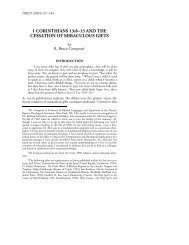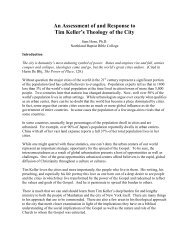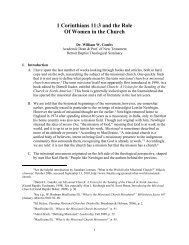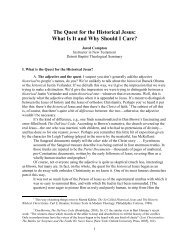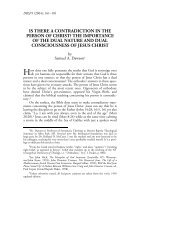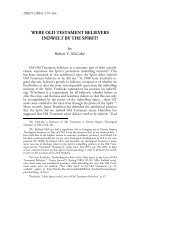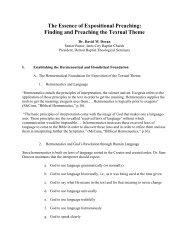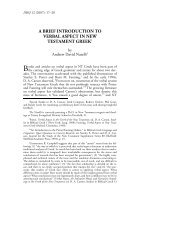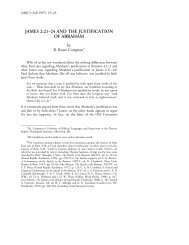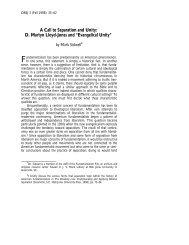Dispensational Sanctification: A Misnomer - Detroit Baptist ...
Dispensational Sanctification: A Misnomer - Detroit Baptist ...
Dispensational Sanctification: A Misnomer - Detroit Baptist ...
You also want an ePaper? Increase the reach of your titles
YUMPU automatically turns print PDFs into web optimized ePapers that Google loves.
<strong>Dispensational</strong> <strong>Sanctification</strong> 101<br />
Ryrie, 29 both of whom have written extensively on the doctrine of<br />
sanctification and both of whose views on sanctification have been tied<br />
to dispensationalism (see pp. 1–2), ever makes the connection between<br />
sanctification and dispensationalism. 30<br />
Thus, after investigating the definition of dispensationalism, we<br />
can find no organic connection between sanctification and dispensationalism.<br />
31 But how are we to understand the model of sanctification<br />
espoused by Chafer, Ryrie, Walvoord and others If it is not to be defined<br />
by its tie to dispensationalism, then how is it to be explained<br />
This leads us to discuss the various models of sanctification in order to<br />
correctly identify this so-called “dispensational sanctification.”<br />
29 Charles Caldwell Ryrie, Balancing the Christian Life (Chicago: Moody Press,<br />
1969), pp. 61–83; idem, “Contrasting Views,” p. 191. As mentioned above on p. 3,<br />
Ryrie prefers to label his view of sanctification as Chaferian rather than dispensational.<br />
30<br />
B. B. Warfield never mentions Chafer’s dispensationalism in his review of<br />
Chafer’s He that Is Spiritual (Princeton Theological Review 17 (April 1919): 322–27).<br />
In light of the fact that Warfield has no problem giving labels to Chafer’s view of<br />
sanctification (such as “Higher Life,” “Arminian,” and “quietistic”), we would expect<br />
him to make a connection between Chafer’s sanctification and his dispensationalism,<br />
but Warfield never does.<br />
31 One might well ask at this point how the Chaferian model of sanctification (to<br />
use Ryrie’s term) ever came to be tied to dispensationalism. There are at least three<br />
suggested proposals, and we will add a fourth. 1) <strong>Dispensational</strong>ism’s tendency to<br />
compartmentalize truth led to this type of sanctification teaching (John F. MacArthur,<br />
Jr., The Gospel According to Jesus [Grand Rapids: Zondervan, 1988], pp. 24–25). 2)<br />
<strong>Dispensational</strong>ism’s emphasis on God’s electing purpose for national Israel suggests<br />
that, regardless of Israel’s sin problems through the centuries, God remains faithful to<br />
His covenant promises to her. This same emphasis is applied to the individual believer<br />
in this present age. The believer is absolutely secure in his relationship with God even<br />
though he or she may fall far away from Him. Thus, the emphasis on carnal as opposed<br />
to spiritual believers occurs (C. Norman Kraus, <strong>Dispensational</strong>ism in America: Its<br />
Rise and Development [Richmond, VA: John Knox, 1958], pp. 61–62). 3) The dispensational<br />
emphasis on pure grace as opposed to the bondage of the Mosaic Law leads to<br />
a rejection of the necessity of the lordship of Christ in the salvation message. This<br />
permits the possibility and expectancy of carnal Christians who have failed to accept<br />
Christ’s lordship in their justified state (MacArthur, Faith Works, pp. 228–29, and<br />
Crenshaw, pp. 82–84). 4) <strong>Dispensational</strong>ism’s expectation of the apostate nature of<br />
Christendom at the end of the present age of grace points to an expectation of disobedience<br />
on the part of true Christians. Hence, a group of carnal Christians is foreseen<br />
by this proposal; if the church were able to avoid carnality, apostasy would not arise.<br />
But one would expect an apostate generation to arise if a group of carnal Christians<br />
failed to train them as they should have.<br />
All of these suggestions are possibilities, but none of them could be considered<br />
theologically necessary. Belief in compartmentalization, the election of national Israel,<br />
emphasis on pure grace as opposed to law, and the apostate nature of Christendom<br />
does not require one to adopt any particular view of sanctification.



